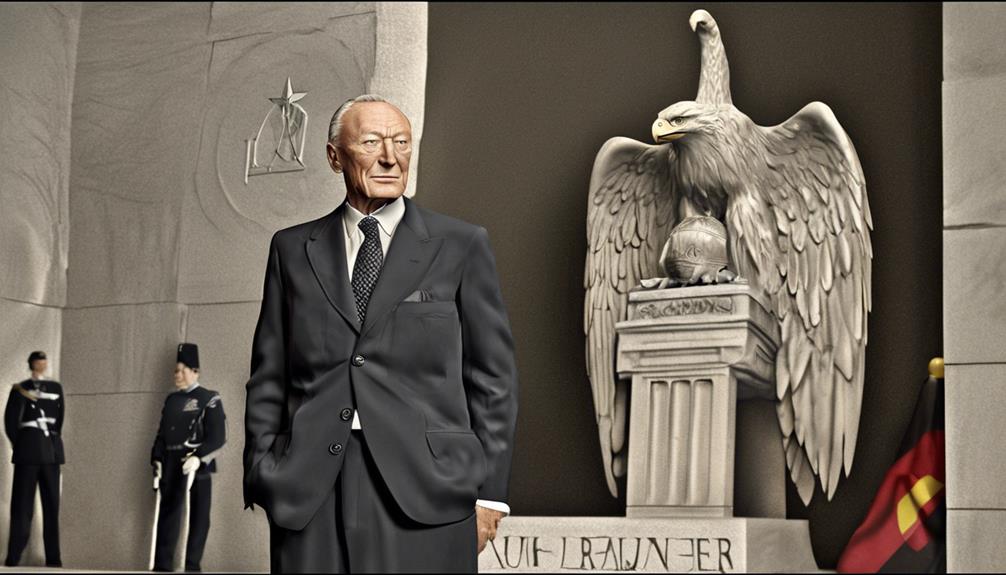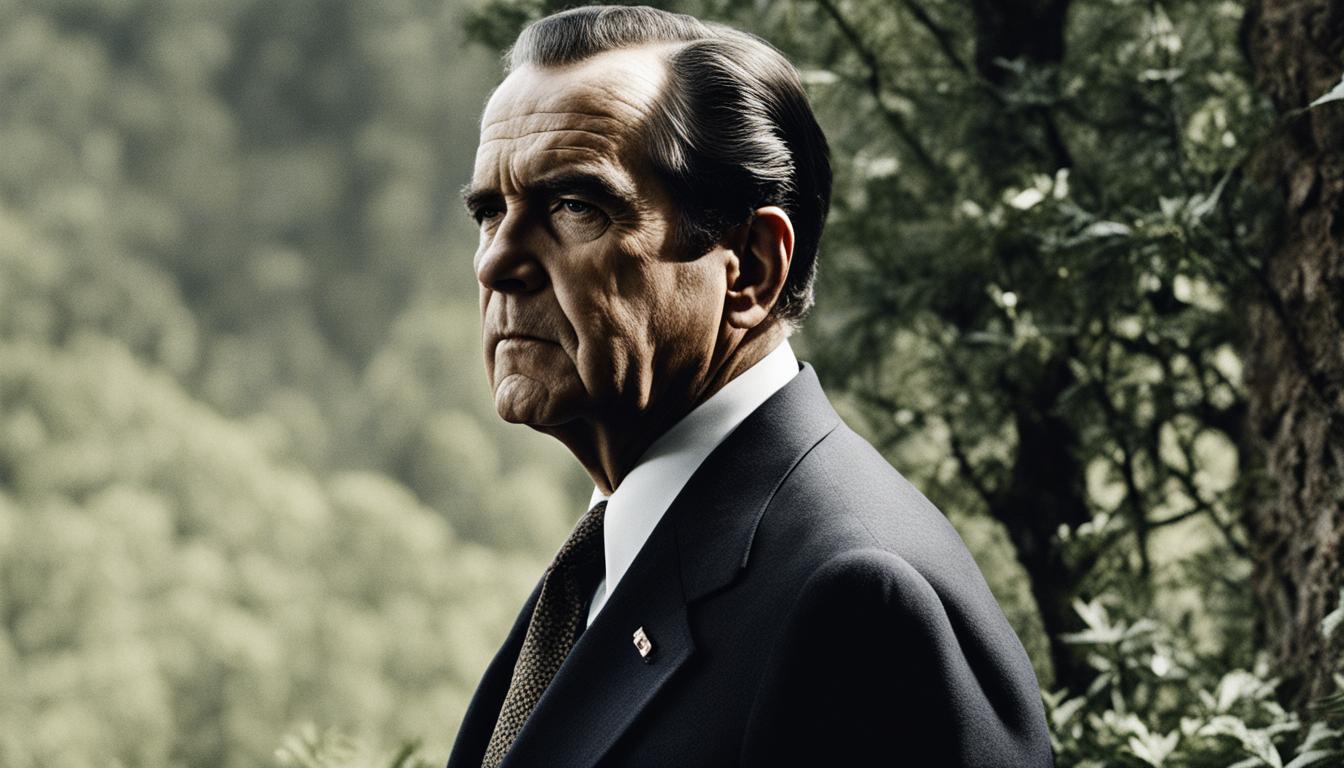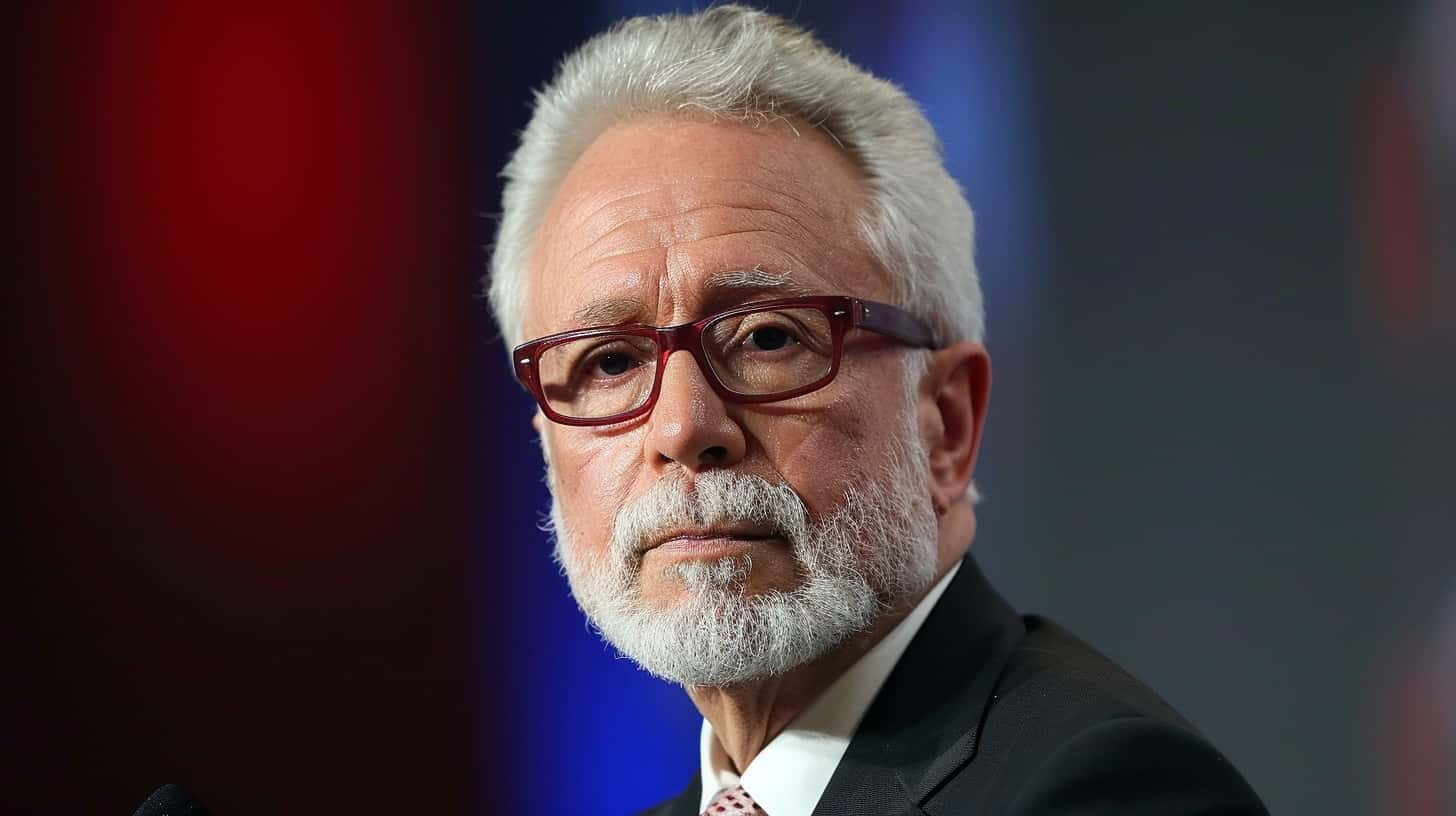Delving into the notable quotations of Konrad Adenauer, the German Chancellor, provides us with a deeper understanding of his significant insight and leadership qualities. The expressions of Adenauer carry with them a clear and profound resonance, marking a durable influence on the realms of politics, governance, diplomacy, and international affairs.
With a vision that transcended borders, he shaped Germany's united future and inspired generations to come. Through his quotes, we learn valuable lessons on effective leadership, economic development, and the pursuit of prosperity.
Adenauer's perspective on these matters remains as relevant today as it was during his time as Chancellor. Join us as we delve into the inspirational words of Konrad Adenauer, a true statesman whose legacy continues to shape our world.
Key Takeaways
- Adenauer had a clear vision of a united Germany and implemented comprehensive policies for post-war reconstruction and modernization.
- He emphasized the importance of diplomacy, international cooperation, and building strong alliances to address global challenges.
- Adenauer prioritized industrialization, international trade, and investment in infrastructure for economic growth and prosperity.
- His leadership and political wisdom laid the foundation for Germany's economic success, contributed to its reintegration into the international community, and ensured the stability of its democratic system.
Adenauer's Vision for a United Germany
What was Konrad Adenauer's vision for a united Germany, and how did he strive to achieve it?
Konrad Adenauer, the first Chancellor of the Federal Republic of Germany, had a clear vision of a united Germany following the devastation of World War II. Adenauer recognized that the unification process would require a comprehensive approach that encompassed both political and economic aspects.
In terms of post-war reconstruction, Adenauer understood that rebuilding the country's infrastructure and economy was crucial. He implemented policies that aimed to modernize industries, improve transportation networks, and promote international trade. Through these efforts, Adenauer aimed to strengthen Germany's position on the global stage and foster economic growth.
In addition to economic reconstruction, Adenauer recognized the importance of political stability for the unification process. He championed the establishment of democratic institutions and the rule of law, ensuring that Germany would be a nation built on democratic principles. Adenauer also emphasized the need to reconcile with Germany's past and promote a sense of national unity.
Furthermore, Adenauer played a significant role in the European integration process. He believed that a united Europe was essential for the stability and prosperity of Germany. Adenauer actively worked towards the creation of the European Coal and Steel Community, which later evolved into the European Union. By fostering closer ties with neighboring countries, Adenauer aimed to strengthen Germany's position as a key player in European affairs.
Leadership Lessons From Konrad Adenauer
After establishing a strong foundation for a united Germany through his vision and efforts in post-war reconstruction and European integration, Konrad Adenauer's leadership provides valuable lessons for aspiring leaders. Here are four key leadership qualities and political strategies that can be learned from his example:
- Visionary leadership: Adenauer had a clear vision for Germany's future and was able to articulate it to the people. He understood the importance of setting long-term goals and inspiring others to work towards them.
- Pragmatism and compromise: Adenauer was known for his ability to navigate complex political landscapes and find common ground with different factions. He understood that compromise was necessary for progress and was willing to make concessions when needed.
- Strategic alliances: Adenauer recognized the importance of building strong alliances both domestically and internationally. He forged partnerships with key political figures and countries, which helped Germany regain its status on the global stage.
- Resilience and determination: Adenauer faced numerous challenges and setbacks throughout his career, but he never wavered in his commitment to his vision for Germany. His resilience and determination were key factors in his success as a leader.
Adenauer's Quotes on Politics and Governance
Adenauer's insightful quotes on politics and governance offer valuable insights into his approach to leadership and the principles he believed were essential for effective governance. His quotes reflect his deep understanding of the complexities of politics and his commitment to upholding democratic values.
One of Adenauer's most famous quotes is, 'Politics is the art of the possible.' This quote encapsulates his pragmatic approach to politics, emphasizing the importance of compromise and negotiation in achieving political goals. Adenauer recognized that effective governance requires finding common ground and working towards practical solutions rather than pursuing ideological purity.
Another key aspect of Adenauer's leadership style was his belief in the importance of stability and continuity in governance. He famously stated, 'Not all that's new is good, and not all that's old is bad.' Adenauer understood the value of building on the successes of the past while also adapting to changing circumstances. This approach allowed him to navigate the challenges of post-war Germany and lay the foundation for the country's economic and political resurgence.
Adenauer's legacy as a leader who prioritized stability, pragmatism, and democratic values continues to influence political leaders today. His quotes serve as a reminder of the enduring principles that underpin effective governance and provide valuable lessons for those seeking to navigate the complexities of politics.
Inspirational Words From Chancellor Adenauer

Chancellor Adenauer's profound words of inspiration continue to resonate with leaders and citizens alike, offering timeless wisdom and guidance in navigating the complexities of life and governance. His quotes encapsulate the essence of inspiring leadership and political wisdom, providing valuable insights for those seeking to make a positive impact in their spheres of influence.
Here are four notable quotes from Chancellor Adenauer that exemplify his deep understanding of leadership and politics:
- 'In politics, achieving the impossible is often merely a matter of seeing the inevitable before others do.' This quote highlights Adenauer's ability to envision and pursue ambitious goals, even when they seemed unattainable to others. It emphasizes the importance of foresight and the ability to recognize opportunities before they become apparent to everyone else.
- 'Politics is a strong and slow boring of hard boards.' Adenauer's words remind us that meaningful change requires persistence and patience. It underscores the need for leaders to be steadfast in their efforts, even when faced with obstacles and setbacks.
- 'We all live under the same sky, but we don't all have the same horizon.' This quote reflects Adenauer's belief in the importance of diversity and inclusivity. It underscores the need for leaders to recognize and value different perspectives, understanding that a broader horizon leads to better decision-making and governance.
- 'The art of politics is to be able to predict what'll happen tomorrow, next week, next month, and next year. And to have the ability afterwards to explain why it didn't happen.' This quote highlights Adenauer's astute understanding of the complexities of politics. It emphasizes the need for leaders to anticipate and adapt to changing circumstances, while also being able to reflect and learn from their mistakes.
Chancellor Adenauer's inspiring leadership and political wisdom continue to be a source of inspiration for both current and aspiring leaders. His words serve as a reminder of the enduring principles and values that underpin effective governance and leadership.
Adenauer's Perspective on Diplomacy and International Relations
Adenauer's understanding of diplomacy and international relations is marked by a meticulous analysis of global dynamics and a commitment to fostering collaborative solutions. Adenauer believed that diplomatic strategies were crucial in maintaining peace and stability among nations. He recognized the importance of engaging in dialogue and negotiations to resolve conflicts and promote mutual understanding.
Adenauer emphasized the significance of international cooperation in addressing global challenges. He believed that nations should work together to achieve common goals and promote shared interests. Adenauer understood that no single country could address complex global issues on its own, and that international cooperation was essential for finding effective solutions.
In his approach to diplomacy and international relations, Adenauer advocated for building strong alliances and partnerships. He believed that by forming strategic alliances, countries could leverage their collective strength to advance their interests and promote stability. Adenauer also emphasized the importance of maintaining open lines of communication and fostering trust among nations.
Adenauer's Views on Economic Development and Prosperity
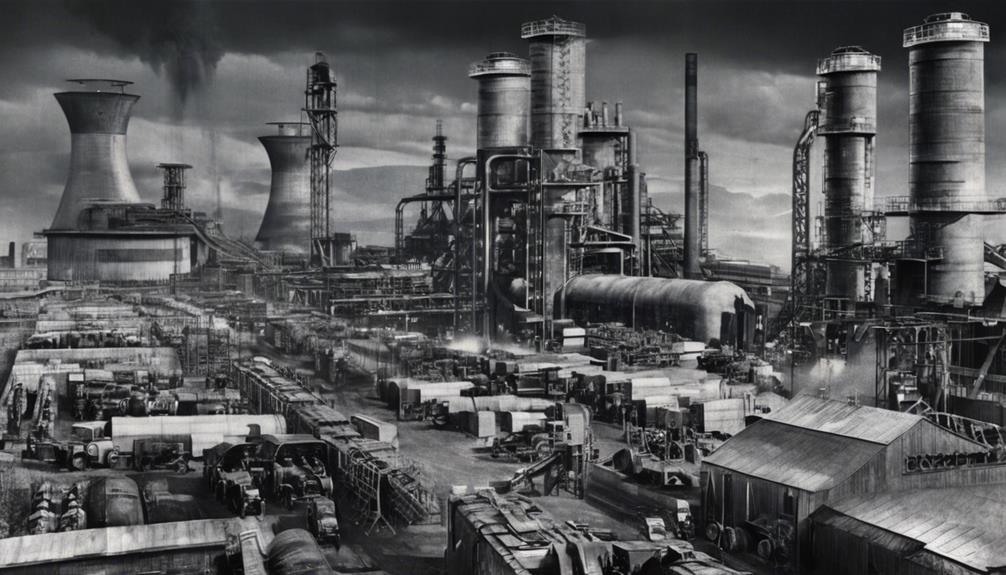
Adenauer's perspective on economic development and prosperity was shaped by a comprehensive understanding of global trade dynamics and a commitment to fostering sustainable growth. His views on economic growth and poverty reduction can be summarized as follows:
- Prioritizing industrialization: Adenauer believed that industrial development was crucial for economic growth. He emphasized the need for investment in key industries, such as manufacturing and technology, to stimulate productivity and create employment opportunities.
- Promoting international trade: Adenauer recognized the importance of international trade in driving economic prosperity. He advocated for open markets and the elimination of trade barriers, as he believed that increased trade would lead to higher economic growth and improved living standards.
- Investing in infrastructure: Adenauer understood the significance of infrastructure development in supporting economic growth. He championed investments in transportation, energy, and telecommunications infrastructure, as these were essential for facilitating trade, attracting foreign investment, and connecting people to economic opportunities.
- Social welfare programs: Adenauer recognized that economic development shouldn't solely focus on wealth creation but also on poverty reduction and social welfare. He supported the establishment of social security systems, healthcare programs, and education initiatives to ensure that the benefits of economic growth were shared equitably among the population.
Adenauer's vision for economic development and prosperity centered on fostering sustainable growth, reducing poverty, and creating opportunities for all. His policies laid the foundation for Germany's post-war economic miracle and continue to inspire leaders around the world.
Legacy and Impact of Konrad Adenauer
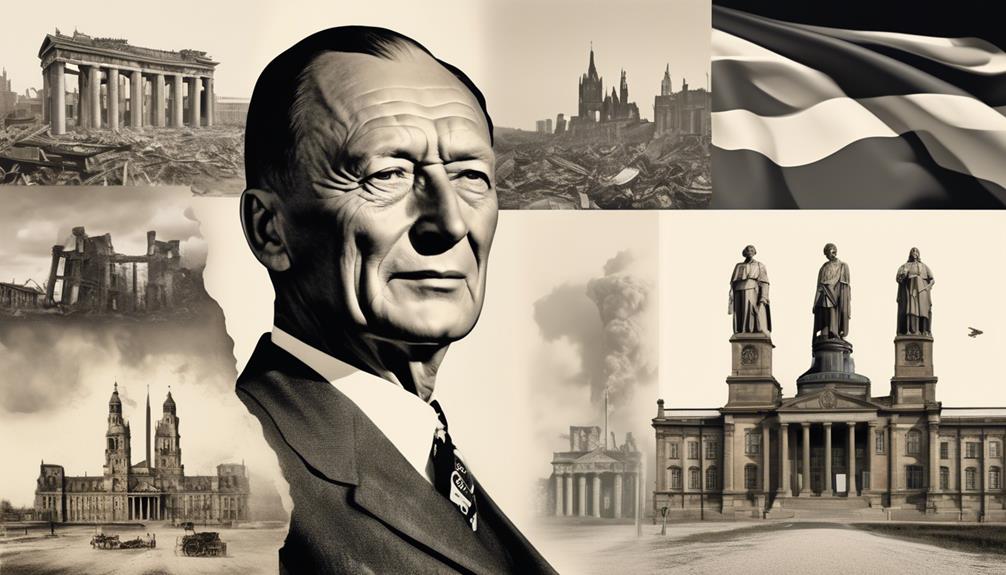
Adenauer's economic policies had a significant impact on post-war Germany. Through his implementation of free market principles and the creation of the social market economy, Adenauer laid the foundation for Germany's economic success and helped to rebuild the country's infrastructure.
Additionally, his skilled diplomacy and strong foreign relations contributed to Germany's reintegration into the international community and its rise as a global power.
Lastly, Adenauer's political reforms, such as the Basic Law and the establishment of democratic institutions, ensured the stability and long-term success of Germany's democratic system.
Adenauer's Economic Policies
Konrad Adenauer's economic policies left a lasting legacy and had a significant impact on the post-war reconstruction and economic development of Germany. Under his leadership, Germany experienced unprecedented economic growth and became one of the world's leading industrial nations.
Here are four key aspects of Adenauer's economic reforms:
- Economic Stability: Adenauer implemented policies aimed at stabilizing the German economy, such as the introduction of a stable currency and the establishment of the Deutsche Bundesbank.
- Market Liberalization: Adenauer promoted free market principles and encouraged private enterprise, leading to increased competition and innovation in the German economy.
- Industrial Modernization: Adenauer recognized the importance of modernizing Germany's industries and invested heavily in infrastructure, technology, and research and development.
- European Integration: Adenauer played a crucial role in the formation of the European Economic Community, fostering economic cooperation and trade among European nations.
Adenauer's economic policies laid the foundation for Germany's economic success and set the stage for its emergence as a global economic powerhouse.
Adenauer's Foreign Relations
The legacy and impact of Konrad Adenauer on foreign relations can be seen through his strategic diplomatic efforts and contributions to international peace and cooperation.
Adenauer's peace initiatives played a crucial role in rebuilding Germany's reputation after World War II. He prioritized reconciliation with France, leading to the signing of the Élysée Treaty in 1963, which laid the foundation for a lasting friendship between the two countries.
Adenauer also played a pivotal role in European integration, advocating for the establishment of the European Coal and Steel Community (ECSC) and the European Economic Community (EEC). These initiatives aimed to promote economic cooperation and prevent another devastating war in Europe.
Adenauer's vision of a united Europe laid the groundwork for the European Union as we know it today, showcasing his lasting impact on foreign relations.
Adenauer's Political Reforms
After showcasing his lasting impact on foreign relations, it's now time to explore the legacy and impact of Konrad Adenauer's political reforms.
Adenauer played a crucial role in European integration, contributing significantly to the establishment of the European Economic Community (EEC) and the European Coal and Steel Community (ECSC). His vision for a united Europe laid the foundation for the European Union as we know it today.
Additionally, Adenauer's contributions to German democracy can't be overstated. He was instrumental in the creation of a stable parliamentary system, strengthening the rule of law, and promoting democratic values in post-war Germany.
Adenauer's reforms also led to the decentralization of power, allowing for greater participation and representation at the local level.
Frequently Asked Questions
What Were Konrad Adenauer's Hobbies or Personal Interests Outside of Politics?
Konrad Adenauer's hobbies or personal interests outside of politics were painting and gardening. These activities allowed him to unwind and engage in creative expression.
Painting provided an outlet for his artistic inclinations, while gardening allowed him to connect with nature and cultivate a sense of tranquility.
These hobbies showcased Adenauer's multifaceted personality and demonstrated his ability to find joy and fulfillment outside of his political responsibilities.
Did Konrad Adenauer Face Any Major Scandals or Controversies During His Time as Chancellor of Germany?
During his time as Chancellor of Germany, Konrad Adenauer didn't face any major scandals or controversies. His leadership was marked by stability and a focus on rebuilding the country after World War II.
Adenauer was known for his strong political skills and ability to navigate through challenging situations. His commitment to democracy and economic prosperity earned him respect both nationally and internationally.
Adenauer's tenure as Chancellor was characterized by a steady and successful approach to governance.
How Did Konrad Adenauer's Upbringing and Background Influence His Political Career?
Political influences and childhood experiences shaped Konrad Adenauer's remarkable political career.
His upbringing in a conservative Catholic family instilled in him a strong sense of duty and a commitment to traditional values.
Adenauer's early involvement in local politics and his experiences during World War I further fueled his desire to shape Germany's future.
These formative years laid the foundation for his leadership as Chancellor, where he pursued policies that prioritized stability, economic growth, and the reconciliation of Germany with the international community.
What Were Some of the Major Challenges That Konrad Adenauer Faced During His Leadership?
Challenges faced during Konrad Adenauer's leadership were numerous and complex. Economic reconstruction, political division, and Cold War tensions were just a few of the obstacles he confronted.
Despite these challenges, Adenauer achieved remarkable accomplishments. He successfully guided Germany through the post-war era and played a pivotal role in the country's integration into the international community.
Adenauer's visionary leadership and steadfast determination were instrumental in Germany's transformation into a prosperous and stable nation.
How Did Konrad Adenauer Contribute to the European Integration and the Formation of the European Union?
Konrad Adenauer played a significant role in the European integration and the formation of the European Union. He recognized the importance of economic and political cooperation among European nations to prevent another devastating war.
Adenauer actively pursued partnerships and alliances, such as the European Coal and Steel Community, which laid the foundation for the European Union. His commitment to European integration demonstrated his vision for a united Europe, fostering peace and prosperity for all member countries.
What were some of Konrad Adenauer’s most notable quotes as Chancellor of Germany?
Konrad Adenauer, the first chancellor of West Germany, was known for his wise and inspiring quotes. One of his most famous quotes is “We all live under the same sky, but we don’t all have the same horizon.” This quote is still relevant today and resonates with people around the world. Angela Merkel famous quotes have also left a lasting impact on the world stage.
Conclusion
In the grand tapestry of history, Konrad Adenauer's legacy shines like a guiding star. His visionary leadership and unwavering commitment to a united Germany brought hope and prosperity to a nation in turmoil.
Adenauer's quotes on politics and governance serve as beacons of wisdom, illuminating the path towards a fair and just society. His perspective on diplomacy and international relations reminds us of the power of dialogue and understanding.
Adenauer's views on economic development and prosperity continue to inspire generations, leaving an indelible mark on the world.
Joy, as our Editor in Chief, ensures the highest standard of content. Her talent in writing is complemented by her attention to detail and passion for literature and culture. Joy’s expertise and love for the English language shine through in her editorial work, making each piece a testament to quality and clarity.
